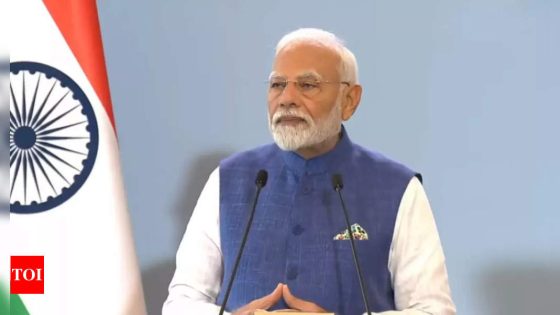Ahead of his departure for Kyiv, PM Narendra Modi joined his Polish counterpart Donald Tusk in expressing deep concern over the war raging in Ukraine, including its “terrible and tragic” humanitarian consequences.
In a joint statement, Modi and Tusk called for a comprehensive, just, and lasting peace in line with international law, consistent with the purposes and principles of the UN Charter, including respect for sovereignty and territorial integrity.
As he mentioned the Ukraine and West Asia conflicts in his media statement after the talks with Tusk, Modi described the loss of innocent lives as the biggest challenge to humanity and said India stood ready to provide every possible help along with other friendly countries for an early return of peace and stability in the region.
Modi also reiterated his message to President Vladimir Putin, when he met him in Moscow in July during a visit which caused great consternation in the West, that solution to any problem cannot be found on the battlefield.
The PMs spoke about the negative impact of the Ukraine war on global food and energy security, especially for the Global South, and said the threat of use of nuclear weapons is unacceptable.
“They underscored the importance of upholding international law, and in line with the UN Charter, reiterated that all states must refrain from the threat of or use of force against the territorial integrity and sovereignty or political independence of any state,’’ said the joint statement.
Tusk described Modi’s Ukraine visit as historic and said Poland believed India can play a very essential and constructive role in ending the war. “PM Modi confirmed his willingness that he is ready for peaceful, rightful and immediate end to war, “said Tusk.
After his engagements in Warsaw, Modi flew from Warsaw to the Rzeszow Jasionka airport in southeastern Poland and drove to Przemysl on the Polish-Ukrainian border, from where he undertook a 10-hour overnight train journey to Kyiv. Most leaders including US President Joe Biden, his French counterpart Emmanuel Macron and German Chancellor Olaf Scholz have used the same “VIP” train run by the Ukrainians to travel to Kyiv.
The first visit by any Indian PM to Ukraine will last for 7-8 hours, during which Modi will have bilateral talks with President Volodymyr Zelenskyy and interact with the Indian community, including students.
“We support dialogue and diplomacy for an early return of peace and stability. For this, we are willing to contribute in every possible way along with our friendly countries,” said Modi.
During his meeting with Zelenskyy, Modi is more likely to reiterate his government’s position that it’s ready to offer any assistance within its means for restoration of peace than to come up with his own formal proposal for peace. India has maintained that while it’s open to mediate if it’s asked to, it won’t initiate any peace proposal on its own. The Indian government wants Russia to be also involved in any international initiative for enduring peace. While Zelenskyy is expected to focus on his 10-point peace plan that seeks Russian withdrawal from Ukraine and accountability for war crimes, it’s unlikely that Modi will endorse it.
The PM delivered a similar message of peace while addressing the Indian community in Warsaw on Wednesday, as he said India is the land of Lord Buddha’s legacy, does not believe in war and advocates for peace in this region.
“India is an advocate of permanent peace in this region. India’s concept is clear: this is not an era of war, and it is the time to unite to tackle the biggest challenges of humanity. Thus, India believes in dialogue and diplomacy to resolve conflict,” he had said.
In a joint statement, Modi and Tusk called for a comprehensive, just, and lasting peace in line with international law, consistent with the purposes and principles of the UN Charter, including respect for sovereignty and territorial integrity.
As he mentioned the Ukraine and West Asia conflicts in his media statement after the talks with Tusk, Modi described the loss of innocent lives as the biggest challenge to humanity and said India stood ready to provide every possible help along with other friendly countries for an early return of peace and stability in the region.
Modi also reiterated his message to President Vladimir Putin, when he met him in Moscow in July during a visit which caused great consternation in the West, that solution to any problem cannot be found on the battlefield.
The PMs spoke about the negative impact of the Ukraine war on global food and energy security, especially for the Global South, and said the threat of use of nuclear weapons is unacceptable.
“They underscored the importance of upholding international law, and in line with the UN Charter, reiterated that all states must refrain from the threat of or use of force against the territorial integrity and sovereignty or political independence of any state,’’ said the joint statement.
Tusk described Modi’s Ukraine visit as historic and said Poland believed India can play a very essential and constructive role in ending the war. “PM Modi confirmed his willingness that he is ready for peaceful, rightful and immediate end to war, “said Tusk.
After his engagements in Warsaw, Modi flew from Warsaw to the Rzeszow Jasionka airport in southeastern Poland and drove to Przemysl on the Polish-Ukrainian border, from where he undertook a 10-hour overnight train journey to Kyiv. Most leaders including US President Joe Biden, his French counterpart Emmanuel Macron and German Chancellor Olaf Scholz have used the same “VIP” train run by the Ukrainians to travel to Kyiv.
The first visit by any Indian PM to Ukraine will last for 7-8 hours, during which Modi will have bilateral talks with President Volodymyr Zelenskyy and interact with the Indian community, including students.
“We support dialogue and diplomacy for an early return of peace and stability. For this, we are willing to contribute in every possible way along with our friendly countries,” said Modi.
During his meeting with Zelenskyy, Modi is more likely to reiterate his government’s position that it’s ready to offer any assistance within its means for restoration of peace than to come up with his own formal proposal for peace. India has maintained that while it’s open to mediate if it’s asked to, it won’t initiate any peace proposal on its own. The Indian government wants Russia to be also involved in any international initiative for enduring peace. While Zelenskyy is expected to focus on his 10-point peace plan that seeks Russian withdrawal from Ukraine and accountability for war crimes, it’s unlikely that Modi will endorse it.
The PM delivered a similar message of peace while addressing the Indian community in Warsaw on Wednesday, as he said India is the land of Lord Buddha’s legacy, does not believe in war and advocates for peace in this region.
“India is an advocate of permanent peace in this region. India’s concept is clear: this is not an era of war, and it is the time to unite to tackle the biggest challenges of humanity. Thus, India believes in dialogue and diplomacy to resolve conflict,” he had said.
Source Agencies


